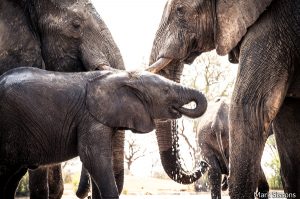Where there’s water there’s life. One travel company, Wildland Adventures, engages its guests in the miracles that come with securing reliable and safe water for wildlife and villages in one arid region of sub-Saharan Africa.
Wildland Adventures’ 11-day Zimbabwe 2020 Water for Hwange Conservation Safari immerses visitors into a symbiosis of wildlife viewing, village life, community development and hands-on conservation efforts. This is the second year for what is becoming the company’s best-selling safari. It doubled the number of departures for the 2020 season.

“Wildland travelers on this safari make an enormous difference and are agents for positive change in Africa. With water comes life, there’s a better quality of life for villagers and an exponential increase in the numbers of elephants and other wildlife that people travel so far to see,” said Kurt Kutay, Wildland Adventures’ founding CEO/President.
In 2019, Kutay’s company made investments and led a GoFundMe campaign to purchase, install and maintain solar-hybrid water pumps that are becoming game changers in and around Hwange National Park. “The fact that guests get to see the pumps in action, along with the herds of elephants that congregate to the waterholes, and then meet the rangers who protect them, and the communities who benefit from tourism, is incredibly gratifying to us and our travelers,” Kutay concludes.
A guest on Wildland Adventures’ inaugural 2019 conservation safari said: "I chose this trip because I love elephants and the opportunity to contribute to the local community while on safari was the deciding factor. But my best memories will be of the children in the schools and the visit to the headman's home, along with eating meals with our guides, watching elephants in the blinds, and pump visits.”
Wildland Adventures and its partners have been instrumental in installing and maintaining a growing inventory of solar-hybrid water pumps that assist the conservation of elephants and other wildlife. These pumps are also making life easier for villagers bordering Hwange National Park in western Zimbabwe. They no longer have to spend hours pumping water by hand or walking long distances to carry it home. Replacing two old diesel pumps with solar-hybrid water pumps has impacted 10,000 elephants and 3,500 Cape buffalo. The same strategy replaced hand pumps in two villages, impacting over 350 households and close to 4,000 livestock.
There are two departures of this life-altering conservation safari. Guests meet teachers and children in village schools, sit with community leaders and spend a night in the field with anti-poaching patrols. On mountain bikes they pedal by creatures drinking at solar-diesel-pump-driven water holes and help monitor the pumps. Riding the colonial-era, 24-passenger Elephant Express rail car with an eye out for cavorting wildlife; canoeing on the Zambezi River; participating in game drives and in the excitement of viewing wildlife from underground blinds are part of the adventure that begins at Gorges Lodge at Victoria Falls.
Accommodations are pioneering lodges built on community land. Guest stays help improve schools, provide clean domestic water supplies and health clinics in local villages. Historically tribal communities received little direct benefit from Zimbabwe’s booming tourism industry. For the rural village living next to a national park, wildlife was by no means an attraction. Elephants ate crops and lions killed livestock. These animals were problematic and to the locals something neither to encourage nor to protect. With the benefits from tourism providing income, water, food and medical care, today ex-poachers are working as guides and helping staff the camp.
The park is just an hour south of Victoria Falls, the first stop on this itinerary. From the bountiful falls of the Zambezi River, guests witness the arid realities within the park that has no major rivers. Year-round water supplies (including an aging infrastructure of diesel pumps and bore holes) are, therefore, unreliable for villagers and some 45,000 elephants. This region of grasslands and mopane woodland supports over 100 species of mammals including lion, leopard, cheetah, African wild dog and the rare sable antelope.
The Wildland Adventures safari is led by resident guru safari guide Mark Butcher, a native Zimbabwean and visionary conservationist who directs wildlife conservation and community development in and around Hwange. Mark leads guests on walks in the bush to experience firsthand the impact that renewed water resources have on the wildlife and communities of Hwange.
Included in the per person double rate is a tax-deductible donation to Wildland Adventures’ non-profit Travelers Conservation Trust Foundation that dedicates 100 percent of contributions directly to support the communities guests visit. Last year was a severe drought year in Zimbabwe. Wildland contributed $4,000 to its partner’s school feeding program which in 2019 provided 425,000 meals to children in the region.
